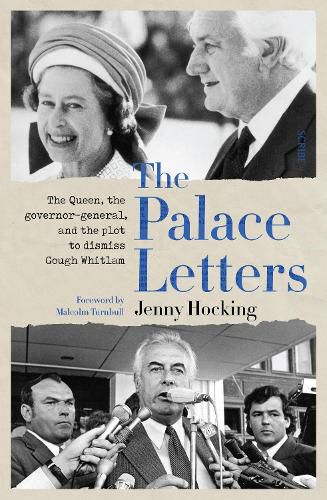Readings Newsletter
Become a Readings Member to make your shopping experience even easier.
Sign in or sign up for free!
You’re not far away from qualifying for FREE standard shipping within Australia
You’ve qualified for FREE standard shipping within Australia
The cart is loading…






What role did the queen play in the governor-general Sir John Kerr’s plans to dismiss prime minister Gough Whitlam in 1975, which unleashed one of the most divisive episodes in Australia’s political history? And why weren’t we told?
Under the cover of being designated as private correspondence, the letters between the queen and the governor-general about the dismissal have been locked away for decades in the National Archives of Australia, and embargoed by the queen potentially forever. This ruse has furthered the fiction that the queen and the Palace had no warning of or role in Kerr’s actions.
In the face of this, Professor Jenny Hocking embarked on a four-year legal battle to force the Archives to release the letters. In 2015, she mounted a crowd-funded campaign, securing a stellar pro bono team that took her case all the way to the High Court of Australia.
Now, drawing on never-before-published material from Kerr’s archives and her submissions to the court, Hocking traces the collusion and deception behind the dismissal, and charts the private role of High Court judges, the queen’s private secretary, and the leader of the opposition, Malcolm Fraser, in Kerr’s actions, and the prior knowledge of the queen and Prince Charles.
Hocking also reveals the obstruction, intrigue, and duplicity she faced, raising disturbing questions about the role of the National Archives in preventing access to its own historical material and in enforcing royal secrecy over its documents.
$9.00 standard shipping within Australia
FREE standard shipping within Australia for orders over $100.00
Express & International shipping calculated at checkout
What role did the queen play in the governor-general Sir John Kerr’s plans to dismiss prime minister Gough Whitlam in 1975, which unleashed one of the most divisive episodes in Australia’s political history? And why weren’t we told?
Under the cover of being designated as private correspondence, the letters between the queen and the governor-general about the dismissal have been locked away for decades in the National Archives of Australia, and embargoed by the queen potentially forever. This ruse has furthered the fiction that the queen and the Palace had no warning of or role in Kerr’s actions.
In the face of this, Professor Jenny Hocking embarked on a four-year legal battle to force the Archives to release the letters. In 2015, she mounted a crowd-funded campaign, securing a stellar pro bono team that took her case all the way to the High Court of Australia.
Now, drawing on never-before-published material from Kerr’s archives and her submissions to the court, Hocking traces the collusion and deception behind the dismissal, and charts the private role of High Court judges, the queen’s private secretary, and the leader of the opposition, Malcolm Fraser, in Kerr’s actions, and the prior knowledge of the queen and Prince Charles.
Hocking also reveals the obstruction, intrigue, and duplicity she faced, raising disturbing questions about the role of the National Archives in preventing access to its own historical material and in enforcing royal secrecy over its documents.
Would these historic letters between the Queen and the governor-general about Kerr’s dismissal of the Whitlam government be recognised as Commonwealth records and opened for public access? Could we now, forty-three years later, finally know that history?
On one of my first days at Readings, a phone customer tasked me with grabbing a copy of a Gough Whitlam biography from our bargain table. After tracking down the tome and returning triumphantly to my phone call, I was soon sharply reprimanded after mispronouncing the prime minister’s name. I had been in Australia for a month at that point. Around the same time I was mangling Whitlam’s name, Jenny Hocking commenced action in the Federal Court of Australia seeking the release of the Palace Letters. Thus began Hocking’s four-year legal battle to force the National Archives of Australia to release the correspondence between Governor-General Kerr and Buckingham Palace in the lead up to Kerr’s dismissal of Whitlam. It wasn’t until May of this year that the High Court of Australia ruled in her favour and uncovered a piece of Australia’s political history. The Palace Letters tracks the course of this legal action and reveals the extent of the collusion and the deception behind the dismissal. Just how much did Queen Elizabeth and Prince Charles know in the lead up to the dismissal?
A courtroom drama with political and historical intrigue, it reads like John Grisham crossed with Dan Brown – but more exciting than either because it all actually happened. This is a fantastic read and an important part of Australian history. I finished this book with an intense amount of admiration and gratitude for Jenny Hocking and historians like her who work in the interests of the public and posterity. Former chief justice Sir Anthony Mason may owe history nothing, but history owes Jenny Hocking a great deal. I promise to never mispronounce Gough again.
Offering a wealth of history across the ages, the books in this collection focus on female authors.